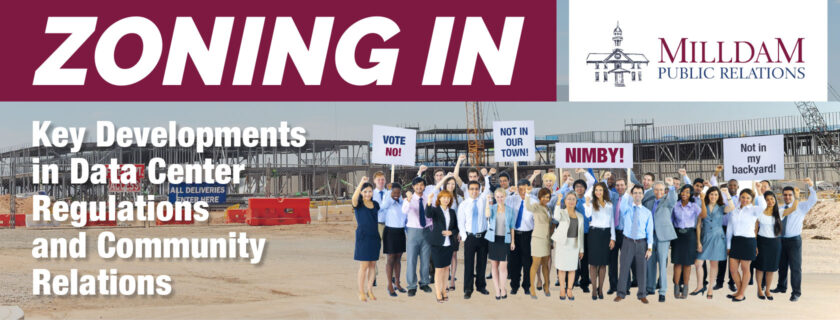Data Center Challenges and Community Relations
October 15, 2024
We’re excited to introduce a new addition to our content lineup: “Zoning In.” This weekly series informs the data center ecosystem of the latest local data center regulations and challenges in community relations nationwide. As data centers continue to garner mainstream coverage and residents deploy more sophisticated tactics and better organizing, these weekly updates will spotlight critical trends and challenges data centers encounter in different communities while, providing insights on navigating the ever-evolving regulatory landscape.
This series ties directly into our Data Center Community Relations Practice, where we help data centers build coalitions, address community pushback, and use other strategies to strengthen relationships at the local level. Stay tuned for timely updates and strategic insights to keep you ahead of the curve!
Each week, we will publish a new report on our website and a summary on LinkedIn. If you want to receive it in your inbox, please email info@milldapr.com and request to be added to the Zoning In Newsletter.
AEP Ohio Pushes Back on Tech Giants’ Data Center Tariff Proposal
AEP Ohio is urging the Public Utilities Commission of Ohio (PUCO) to reject a settlement proposal from Amazon, Google, Microsoft, and others that outlines terms for connecting data centers to the grid. AEP Ohio argues that the proposal, which includes favorable terms for tech companies, could place unfair financial burdens on residential customers by shifting the cost of transmission upgrades onto them. The utility’s original plan required data centers to sign long-term electric service contracts, aiming to protect consumers from the costs of future grid expansions. AEP Ohio claims the tech companies’ proposal is unprecedented, bypasses the utility’s input, and undermines the ability to provide adequate service. The utility, alongside other organizations, is calling for the PUCO to allow the upcoming hearing and testimony on its tariff application rather than approving the tech giants’ settlement.
Read the full article at Utility Dive
Amid Resident Concerns, Henrico Planning Commission Recommends Denial of Proposed Data Center
At its October 10 meeting, the Henrico Planning Commission recommended denying a proposed data center and light industrial complex. Despite the Planning Department staff’s support for the project, nearby residents voiced concerns over potential noise, traffic, and environmental impacts.
The developer, BWS Enterprises LLC, adjusted the project multiple times, ultimately reducing the size to 5.8 acres. The complex would be located closer to residential areas than other approved data centers in the county, raising additional concerns. While the commissioners did not specify a reason for the denial, questions were raised about diesel generator usage and pollution.
Despite the Planning Commission’s recommendation, the proposal will still move forward to the Henrico Board of Supervisors.
Read the full article at The Henrico Citizen
Axios Covers Nationwide Data Center Pushback
A recent article from Axios highlights how the growing opposition to data centers is reaching more mainstream press. This article highlights how many communities in Atlanta and Northern Virginia are pushing back with regulations due to concerns about housing conflicts, noise, and grid strain. National security issues, such as when the White House ordered the shutdown of a Chinese-owned data center in Wyoming, also arise. Texas, facing fast-growing energy demands, is also reviewing the impact of these facilities on the grid.
Read the full article at Axios
Washington Post Covers Community pushback in Peculiar, MO
A recent piece from The Washington Post highlights growing resistance from communities against data center developments in small towns. The piece focuses on a couple of projects, including one in Peculiar, Missouri, led by Diode Investments. Local residents are expressing concerns about noise, water and power consumption, and officials’ lack of transparency. In Peculiar, protests gained momentum after residents shared experiences, research, and visuals of existing data centers, leading to a proposed ban on such projects.
Reads the full article at The Washington Post
Frederick County’s Data Center Zoning Shakeup: New Legislation Could Reshape Development Pathways
Proposed legislation in Frederick County, driven by County Executive Jessica Fitzwater’s data center workgroup, could significantly alter the approval process for data center projects. A key change would be the introduction of a Critical Digital Infrastructure (CDI) floating zone, which would require developers to seek a new zoning designation for parcels already approved for data centers, if they plan to expand. Under the current system, data centers in Limited Industrial (LI) and General Industrial (GI) zones are approved “by right.” The proposed CDI floating zone would give the County Council discretionary power over data center siting, allowing them to approve or deny developments based on strict criteria such as proximity to electrical infrastructure and growth areas.
Read the full article at The Frederick News-Post
Letter-to-Editor from Fayetteville, GA Provides Direct Insights into Resident’s Perception
A resident of Fayetteville, GA, penned a letter to the editor regarding concerns about constructing a massive data center complex in Fayetville, which will be one of the world’s largest multi-tenant facility. The writer raises concerns such as the immense power demands, why power lines can’t be buried, and that Georgia Power is ignoring potential state and federal grants. The resident also criticizes what they perceive as the lack of transparency from the Fayette County Development Authority, suggesting that they prioritized financial gain over the community’s interests. This letter is particularly interesting as it gives a direct glimpse into residents’ thinking.
Read the full letter at The Citizen
Chicago’s Underground Data Center Dream Faces Legal Battle Amidst Community Concerns
The Invert, Chicago’s ambitious proposal to develop a massive 6-million-square-foot underground complex on a former Southeast Side steel mill site encounters legal and environmental hurdles. The project, which could include data centers, vertical farming, and light manufacturing, aims to revitalize the area with green space and job opportunities. However, community activists are wary, fearing potential environmental impacts and accusing developers of using the project as an excuse for mining limestone. While some residents support the development, a legal dispute regarding mining regulations may delay its progress.
Read the full article at ABC 7



